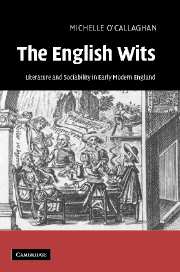Book contents
- Frontmatter
- Frontispiece
- Contents
- Acknowledgements
- Note on the text
- Introduction
- Chapter 1 Gentleman lawyers at the Inns of Court
- Chapter 2 Ben Jonson, the lawyers and the wits
- Chapter 3 Taverns and table talk
- Chapter 4 Wits in the House of Commons
- Chapter 5 Coryats Crudities (1611) and the sociability of print
- Chapter 6 Traveller for the English wits
- Chapter 7 Afterlives of the wits
- Notes
- Bibliography
- Index
Chapter 2 - Ben Jonson, the lawyers and the wits
Published online by Cambridge University Press: 22 September 2009
- Frontmatter
- Frontispiece
- Contents
- Acknowledgements
- Note on the text
- Introduction
- Chapter 1 Gentleman lawyers at the Inns of Court
- Chapter 2 Ben Jonson, the lawyers and the wits
- Chapter 3 Taverns and table talk
- Chapter 4 Wits in the House of Commons
- Chapter 5 Coryats Crudities (1611) and the sociability of print
- Chapter 6 Traveller for the English wits
- Chapter 7 Afterlives of the wits
- Notes
- Bibliography
- Index
Summary
John Aubrey relates the story that, when Jonson was working for his bricklayer step-father ‘on the garden-wall of Lincoln's Inne next to Chancerylane … a bencher, walking thro' and hearing him, discoursing with him, and finding him to have a witt extraordinary, gave him some exhibition to maintaine him at Trinity College in Cambridge’. Elements of this story, such as the bencher sending Jonson to Cambridge, are probably fabrication; nonetheless the vignette dramatises Jonson's familiarity and sense of intellectual companionship with this learned commonwealth. It is appropriate Jonson helped to maintain the physical fabric of the Inns given that his early plays, Every Man Out of His Humour and Poetaster, had their own part to play in the construction of the Inns as the ideal polis. Jonson found the ideal counterpart for the poet-dramatist in the lawyer-orator: he that ‘can feign a commonwealth (which is the poet) can govern it with counsels, strengthen it with laws, correct it with judgements, inform it with religion and morals’. This resoundingly civic paradigm was formulated in a period when Jonson was producing plays that spoke to the interests of the Inns of Court. The Inns' legal culture influenced his dramatic style. His early experiments with comical satire gave the public stage a vital role to play in the commonwealth by turning the theatre into a law court.
- Type
- Chapter
- Information
- The English WitsLiterature and Sociability in Early Modern England, pp. 35 - 59Publisher: Cambridge University PressPrint publication year: 2007



